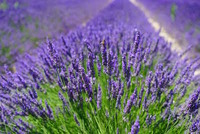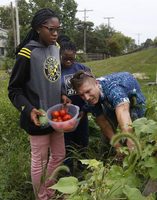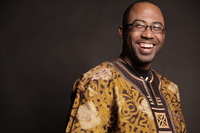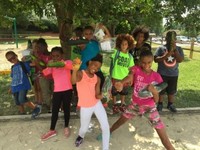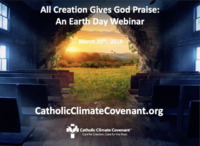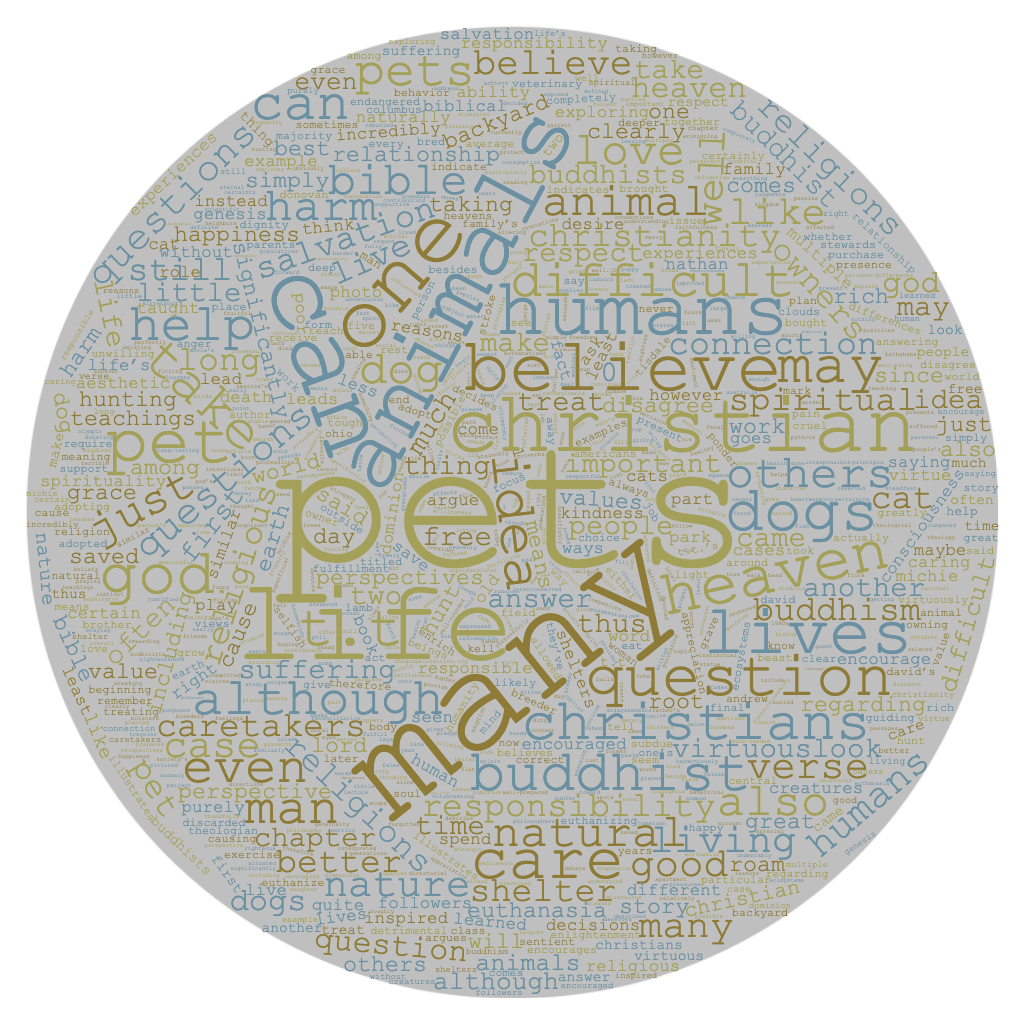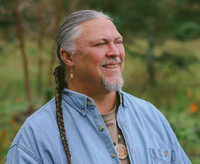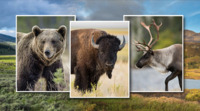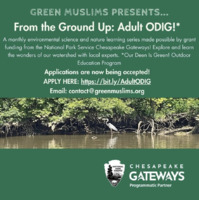Search
81 items
-
10 Eco-Mission Projects
Evangelical Environmental Network MOMS has created a list of family oriented service projects that focus on the environment. These ideas not only offer ways to serve the community, but also take care of God’s earth in simple but effective ways. -
For Love of Lavender
For Love of Lavender is an account of how Christine Sine, creator of Godspace and writer for Evangelical Environmental Network MOMS, encountered God through the beauty, fragrance, and abundance of the lavender in her garden. Reflecting on her garden informs her of God's work and calls to mind numerous bible verses, including Proverbs 27:9: The heart is delighted by the fragrance of oil and sweet perfumes, and in just the same way, the soul is sweetened by the wise counsel of a friend. Christine also mentions how to use these lessons to teach children. -
Faith Based Farms
Faith Based Farms is a webinar about families and communities from across the United States demonstrating their faith through farming. Colm Flynn, a freelance reporter, conducted his research by traveling from New Jersey, to Wisconsin, and to Michigan. During his journey, he enjoyed conversations with a range of diverse individuals and faith-based groups. -
The Villa Farm
The Villa Maria, located in Villa Maria, Pennsylvania, describes itself on their website as the following: "Operating on 759 acres, the farm of Villa Maria Community Center is an integral part of the heritage of the Sisters of the Humility of Mary. The farm serves as a symbol of the struggle and sacrifice of a small group of women who settled on the Lawrence County land in 1864 and succeeded in establishing a viable, productive farm when others before them had failed. Land management at the farm is based on spirituality, sustainability, simplicity and the preservation of all local life systems." The greenhouse is open seasonally along with a produce market that sells the food grown. -
Columbus bonds with Ghana sister city through agriculture project
Roman Catholic Cardinal Peter Turkson spoke at Mershon Auditorium at The Ohio State University in 2015. The proceeds from his talk with OSU President Michael Drake were used as matching funds in a grant from the Initiative for Food and Agricultural Transformation (InFACT) discovery theme program. The proceeds funded an agricultural exchange between Accra, Ghana, and Columbus, Ohio. -
We Are What We Eat
The 214th General Assembly (2002) Presbyterian Church (U.S.A.) approved the following report titled We Are What We Eat. This report focuses on how people can influence the agriculture revolution with regard to sustainability, stewardship compassion, and community. The final section provides suggestions for activities and studies that congregations can engage in with regard to food production/consumption. -
Going Vegan for Lent can Orient us towards Christ's calling
Elyse Durham writes that it is becoming increasingly common for people to give up meat for lent, and makes note that many of the farming practices we use today are unnecessarily cruel. In addition, the consumer culture in America tempts Christians to live lives of greed instead of virtue. Karen Swallow brings up the idea of "reducetarianism," simply considering the amount of meat you consume and its implications for the environment. Fasts and veganism are suggestions for Christians who want to move away from a life of over-consumption. -
Profile: Rev. Dr. Heber M Brown
Rev. Dr. Heber M. Brown is a Baptist pastor in Baltimore, Maryland. Brown is committed to social development and has been instrumental in the creation of several programs in the Baltimore area. These include Orita’s Cross Freedom School, of which he is the founding director, and the Black Church Food Security Network. The latter works to support the accessibility of food by linking historically African American congregations with urban growers and Black farmers. Brown has received a number of awards recognizing his work, including the Ella Baker Freedom Fighter Award and the Food Justice Award from the Baltimore City Office of Civil Rights. -
Columbus YMCA Youth Engage in 4-H Urban Gardening Program for Cultural Exchange with Youth in Accra, Ghana
This summer, dozens of Columbus North YMCA youth participated in 4-H urban gardening programs as part of an urban agriculture exchange program with 4-H and YMCA youth from Accra, Ghana. In response, in May of 2017, three Ghanaian youth and an advisor will travel to Columbus to share their urban agriculture experiences at the annual Ohio Future Farmers of America (FFA) conference at the Ohio State Fairgrounds. Please click the link below to read more: -
Fasting for Climate Justice
Fasting for Climate Justice is a resource from Global Catholic Climate Movement (GCCM ) on the practice of fasting for climate action through two initiatives: meatless Fridays and monthly fasting. The GCCM encourages abstinence from meat on Fridays as a way to reduce one’s negative impact on global climate change. The GCCM also promotes fasting for the climate which takes place the first day of each month. -
Evangelical Environmental Network: Trump Budget would harm National Parks and the Protection of God’s Other Creatures
The president of the Evangelical Environmental Network, Rev. Mitch Hescox, made a statement saying that the budget proposed by the Trump administration is a “devils bargain,” which would harm national parks and the protection of God’s creatures.
“The Trump Administration’s budget, if implemented, would be an abdication of our stewardship of our public lands, which are entrusted to each generation to pass on to their children.” -
Becoming a CreatureKind Institution
“Having compassion for others begs the question of who ‘the others’ are. The animals whom we farm are sentient beings and individuals in their own right, even when they are crowded together in barren cages or windowless sheds. They are surely – in their billions – ‘others’ who deserve and desperately need our compassion. I wish CreatureKind great influence in bringing compassion to these fellow-beings of ours.”
– Joyce D’Silva, Ambassador Emeritus,
Compassion in World Farming
CreatureKind is a Christian animal welfare group that works to help institutions improve their practice as it impacts farmed animals, with benefits for humans, animals, and the environment. Becoming a CreatureKind institution means committing to a cycle of reviewing current sourcing, setting goals for improved practice, and acting on them, together with engaging your community about the program. The program have two major goals: reduce consumption of animal products and obtain remaining animal products from higher welfare. -
CreatureKind Church Course
CreaturKind has created a 6-week course to help Christians think about what their faith means for animals. The course is free and is meant to assist churches in learning about animal welfare and how to care for animals faithfully. They aim to encourage Christians to consider what they believe about God’s creatures and how they might move toward living out those beliefs as members of the body of Christ. -
Environmental Statement – Reformed Church in America
In 1982, the Christian Action Commission of the Reformed Church in America (RCA) released a document titled “Care for the Earth: Theology and Practice.” This was given to General Synod, who then passed several resolutions outlining the Reformed Church in America’s stance on environmental issues. The Action Institute wrote the article below that discusses the resolutions that were passed. -
All Creation Gives God Praise: An Earth Day Webinar
"Every year, Catholic Climate Covenant produces a one-hour educational program. This year [2019] we are focusing on the issue of protecting biodiversity to complement the Earth Day Network's 'Protect Our Species' campaign. In the webinar we explore why the Earth day Network chose the theme of 'Protecting Our Species' and all the wonderful resources and toolkits that they have available for your use. We also delve into the Covenant's Earth Day program and how you can facilitate a program in your parish, school, or religious community." -
The Case for Animal Spirituality - Part 1: Conceptual Challenges, Methodological Considerations, and the Question of Animal Consciousness
This article, written by Paul Cunningham, explores the case for nonhuman animal spirituality. Spirituality goes beyond language, reflective consciousness, or conceptual thought. Animal spirituality and participation in religious phenomena are growing areas of research at the intersection of animal studies and religious studies, this article is a small but emerging discussion of this subfield. -
The Place of Pets in Our Lives: Some Christian and Buddhist Perspectives
This chapter from the student-written book “Emerging Perspectives on Religion and Environmental Values in America” explores the impact of animals and pets on our environmental values. The author discusses their own experiences with pets as well as religious texts and perspectives as they relate to animals. Below is the first paragraph of the chapter to introduce the discussion.
"If you ask a person to tell you about their favorite pet they’ve had, no matter how long it has been since it lived, their faces will most likely light up with joy as they tell you a humorous or heartwarming story about 'the best cat' or 'the best dog in the world!' Love and appreciation for our pets seems to be a relatively universal trait that, for many of us, is also interconnected with our religious or moral values and feelings toward nature." -
Sustainability Photo Contest
This RESTORExchange photo contest is being brought back from the pre-COVID era, and with an added collaboration with the Sustainability Institute. It's based around the question "What does sustainability look like?" This can include sustainability in environmental justice, technology, energy, lifestyle and wellbeing, society and culture, economy and politics, and any other context where you see sustainability in action. We want to see your perspectives and show all the different places that sustainability is practiced! Winning photos will be decided by a panel of judges (yet to be determined), and the top four photos will win a prize! First place will receive $400, second place will receive $300, third place will receive $200, and an honorable mention will receive $100. Submissions will be accepted through March 15, 2023. -
Laudate Deum
"Eight years have passed since I published the Encyclical Letter Laudato Si’, when I wanted to share with all of you, my brothers and sisters of our suffering planet, my heartfelt concerns about the care of our common home. Yet, with the passage of time, I have realized that our responses have not been adequate, while the world in which we live is collapsing and may be nearing the breaking point. In addition to this possibility, it is indubitable that the impact of climate change will increasingly prejudice the lives and families of many persons. We will feel its effects in the areas of healthcare, sources of employment, access to resources, housing, forced migrations, etc.
This is a global social issue and one intimately related to the dignity of human life. The Bishops of the United States have expressed very well this social meaning of our concern about climate change, which goes beyond a merely ecological approach, because 'our care for one another and our care for the earth are intimately bound together. Climate change is one of the principal challenges facing society and the global community. The effects of climate change are borne by the most vulnerable people, whether at home or around the world'. In a few words, the Bishops assembled for the Synod for Amazonia said the same thing: 'Attacks on nature have consequences for people’s lives'. And to express bluntly that this is no longer a secondary or ideological question, but a drama that harms us all, the African bishops stated that climate change makes manifest 'a tragic and striking example of structural sin'.
The reflection and information that we can gather from these past eight years allow us to clarify and complete what we were able to state some time ago. For this reason, and because the situation is now even more pressing, I have wished to share these pages with you." -
Decolonizing Thanksgiving
"As we head into the Thanksgiving holiday weekend in the United States, it’s great to think about all the things we can be grateful for. It is good to have a time to pause and reflect, to participate in the seasonality of gratitude for the year’s bountiful harvest, and to gather with family and friends. (We’ll ignore the über-consumerism of the day following Thanksgiving…)
Many of us probably know by now, however, that the story many of us learned in school about the first Thanksgiving is rather inaccurate at best, and racist and paternalistic in many ways, with a focus on the Manifest Destiny idea of the divine mandate for Europeans to conquer the “New World” in the name of Christ and country.
A few questions come to mind (at least my mind), for those of us with European-American roots, such as:
Should we even celebrate Thanksgiving, since it’s so tainted with colonialism?
What might it look like to “decolonize” our own understandings and our culture?
How can we do this work in a way that encourages our own folks to partner, rather than making them (our White brethren) feel further ostracized, but while also speaking real truth?
What can we do this Thanksgiving to begin to reconcile relationships damaged in the colonial era, both human to human and human to this land?" -
EPN Breakfast: Yellowstone to Yukon: Enhancing Rocky Mountain animal migration through remote sensing and international collaboration
"Caribou, grizzly bears, bison, and many more megafauna and countless bird species rely upon a major migration corridor of western North America spanning the Yellowstone-to-Yukon (Y2Y) region. Y2Y extends more than 3,400 kilometers from the Greater Yellowstone Ecosystem in the western United States to the Arctic Circle in the Yukon Territory of Canada. These species are impacted by roads and other human infrastructure developed throughout the corridor.
Enter the Room to Roam: Y2Y Wildlife Movements (Room2Roam) project. Room2Roam is funded through the NASA Ecological Forecasting Program and is accelerating data analysis and coordination to improve wildlife management efforts across borders. With coordination from Ohio State’s Dr. Gil Bohrer and representatives of seven agencies and conservation groups from First Nations, Canadian provinces and territories, and American states, launched this project from Whitehorse, Yukon Territory, in 2022...
With support from Ohio State's Translational Data Analytics Institute (TDAI), join this EPN event to learn more about this incredible research and partnership endeavor, and its implications for land and resource managers in Ohio and beyond."
The event will take place on 2/13/2024 from 7:15 a.m. to noon at Nationwide and Ohio Farm Bureau 4H Center.
The cost is $25 for non-students, $5 for students, and free for virtual participants. -
From the Ground Up: An Adult Outdoor Education Program
AKA Our Deen is Green! for Adults"We are happy to announce that applications are now being accepted for From the Ground Up: An Adult Outdoor Education Program (aka Our Deen is Green! for adults). This special program, funded by a grant from the National Park Service Chesapeake Gateways Office, will begin after Ramadan, in late April 2024, and continue into spring of 2025. It is a unique opportunity to become immersed in the various facets of ecology, environmental science, sustainability and stewardship. It will include monthly classes, mostly in-person and outdoors in parks and wildlife sanctuaries in DC, Maryland, and Northern Virginia, focused on specific aspects of and issues pertaining to our local region, the Chesapeake Bay Watershed.
Classes will be led by local subject matter experts and include a variety of topics, including local plants and animals, the interconnectedness of our watershed, the challenges it’s facing, and what we can do to help. Specific classes will include:
· An introduction to the Chesapeake Bay Watershed
· Local herps: reptiles and amphibians
· Monitoring stream health with benthic macroinvertebrates
· Stream restoration and invasive plant removal
· The importance of native plants and pollinator gardens
· Watershed education through an interfaith lens
· Native trees
· Soil health
· Environmental justice
· Local birds and “bugs”
· Solar power and clean energy
· Sustainable living
· Water-quality monitoring
· And more!
We are looking for 10-15 strongly committed local residents who are interested in learning about our local watershed, its needs, and what they can do to help it. Participants will be encouraged to create a long-term project or plan of action describing something they will do to support the watershed and/or encourage their families or communities to pay more attention to environmental issues.
Program participants must be able to commit to the majority of the monthly classes. All in-person classes will take place on weekends and last 2 to 4 hours. (We will do our best to help provide transportation if necessary.)
This entire program is being offered free of charge thanks to a National Park Service Chesapeake Gateways grant. The National Park Service Chesapeake Gateways Office (NPS Chesapeake Gateways) offers competitive grant opportunities to advance the Chesapeake Bay Initiative Act of 1998 within the full 41-million-acre Chesapeake Bay watershed. Chesapeake Gateways grants bring out familiar, untold, under-appreciated, or yet to be uncovered narratives and promote resilient communities & landscapes through tourism, sustainability, conservation & local economies throughout the Chesapeake Bay watershed.
The program begins after Ramadan, with the introductory class set for April 21st! Applications are due by March 8th. Access the application form below. Please reach out to us at contact@greenmuslims.org with any questions." -
Checking on the Chickens With the Next Generation
"Checking on the chickens with the next generation. We built the coop from recycled materials, the chickens eat much of our food waste, provide eggs, and encourage us to think about the cycle of our consumption and how we can be more sustainable. We want our son to approach his entire life this way, and these chickens will be his responsibility as soon as able. We live in the city of Columbus so we try to bring a different lifestyle to city living."
Taken by Grace Freeman. Submitted to the Sustainability Photo Contest. -
Old Growth
"This photograph shows my view of old growth redwood trees located in the Redwoods National Park. Enjoying nature is an important aspect of sustainability in that it reminds us of our inherent connection to nature, its beauty, and importance." Taken by Kelsey Wolf. Submitted to the Sustainability Photo Contest. -
A Walk with Sustainability…and the Bolivian Llamas
"In this picture, I am working alongside two rural Bolivian community members (and a llama), collaborating on the design of a water system. The community had no running water, phone service only on hills, cut plastic liter bottles in half for gutters, and still gave me soups and meals as a welcoming and thankfulness. Their kindness, harmony with the land around them, and joy radiated, deeply resonating with my idea of how to live a sustainable, happy life. Sustainability is not buying a reusable water bottle…every 3 months because a new, better, more cool version is here. It is living in gratitude and simplicity with the people and nature around you." Taken by Megan Oleksik. Submitted to the RESTORExchange Sustainability Contest.


